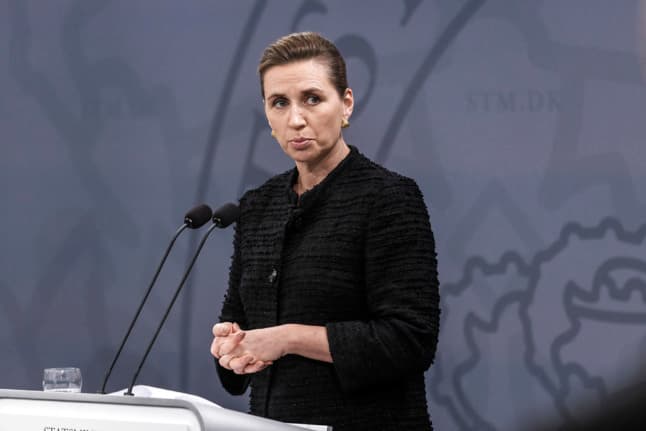PM says Denmark still faces difficulties with Omicron variant

Prime Minister Mette Frederiksen said on Wednesday that Denmark is not clear of the coronavirus crisis and that the Omicron variant remains a potential threat to the country.
Frederiksen’s comments come in the wake of upbeat messaging from the country’s infectious disease agency, the State Serum Institute, which earlier this week suggested ‘normal’ life could return in two months and that Omicron could eventually contribute to immunity levels in the community.
READ ALSO: Covid-19: Denmark could return to ‘normal life in two months’
The Prime Minister’s comments were made in a Facebook update posted in relation to the reopening of schools on Wednesday.
“The very infectious nature of Omicron can present a challenge to a society such as ours if it is allowed to run loose,” she wrote.
“It can lead to too many hospital admissions at once. And too much and too fast transmission can risk businesses and public institutions having to close,” she wrote.
“Then there won’t be enough people to drive trains, care for children elderly and the sick or keep production moving,” she wrote.
Frederiksen echoed the appeals of health authorities by calling for more parents to get their children vaccinated.
“With the return to school in mind I again encourage parents to consider getting your children vaccinated as soon as possible,” she wrote.
Health spokespersons from the various parliamentary parties were scheduled to attend talks with the health minister, Magnus Heunicke, on Wednesday afternoon.
When the current Covid-19 restrictions were announced in December, parliament agreed to make an assessment by January 5th as to whether it will be necessary to keep the measures in place beyond January 17th.
Several parties now support easing restrictions after health authorities said the Omicron variant normally causes more mild disease than the previously-dominant Delta variant, but the government has so far rejected calls to make changes.
Frederiksen wrote in regard to restrictions that “they have helped to put a dampener on transmission”.
“And it has been important to put a stop to potential super spreader events, including in nightlife,” she wrote.
The sales of alcohol is currently banned between 10pm and 5am and bars, restaurants and cafes must close at 11pm.
“Authorities are continually monitoring the situation and this will also be discussed with parties in parliament,” Frederiksen wrote.
Comments
See Also
Frederiksen’s comments come in the wake of upbeat messaging from the country’s infectious disease agency, the State Serum Institute, which earlier this week suggested ‘normal’ life could return in two months and that Omicron could eventually contribute to immunity levels in the community.
READ ALSO: Covid-19: Denmark could return to ‘normal life in two months’
The Prime Minister’s comments were made in a Facebook update posted in relation to the reopening of schools on Wednesday.
“The very infectious nature of Omicron can present a challenge to a society such as ours if it is allowed to run loose,” she wrote.
“It can lead to too many hospital admissions at once. And too much and too fast transmission can risk businesses and public institutions having to close,” she wrote.
“Then there won’t be enough people to drive trains, care for children elderly and the sick or keep production moving,” she wrote.
Frederiksen echoed the appeals of health authorities by calling for more parents to get their children vaccinated.
“With the return to school in mind I again encourage parents to consider getting your children vaccinated as soon as possible,” she wrote.
Health spokespersons from the various parliamentary parties were scheduled to attend talks with the health minister, Magnus Heunicke, on Wednesday afternoon.
When the current Covid-19 restrictions were announced in December, parliament agreed to make an assessment by January 5th as to whether it will be necessary to keep the measures in place beyond January 17th.
Several parties now support easing restrictions after health authorities said the Omicron variant normally causes more mild disease than the previously-dominant Delta variant, but the government has so far rejected calls to make changes.
Frederiksen wrote in regard to restrictions that “they have helped to put a dampener on transmission”.
“And it has been important to put a stop to potential super spreader events, including in nightlife,” she wrote.
The sales of alcohol is currently banned between 10pm and 5am and bars, restaurants and cafes must close at 11pm.
“Authorities are continually monitoring the situation and this will also be discussed with parties in parliament,” Frederiksen wrote.
Join the conversation in our comments section below. Share your own views and experience and if you have a question or suggestion for our journalists then email us at [email protected].
Please keep comments civil, constructive and on topic – and make sure to read our terms of use before getting involved.
Please log in here to leave a comment.